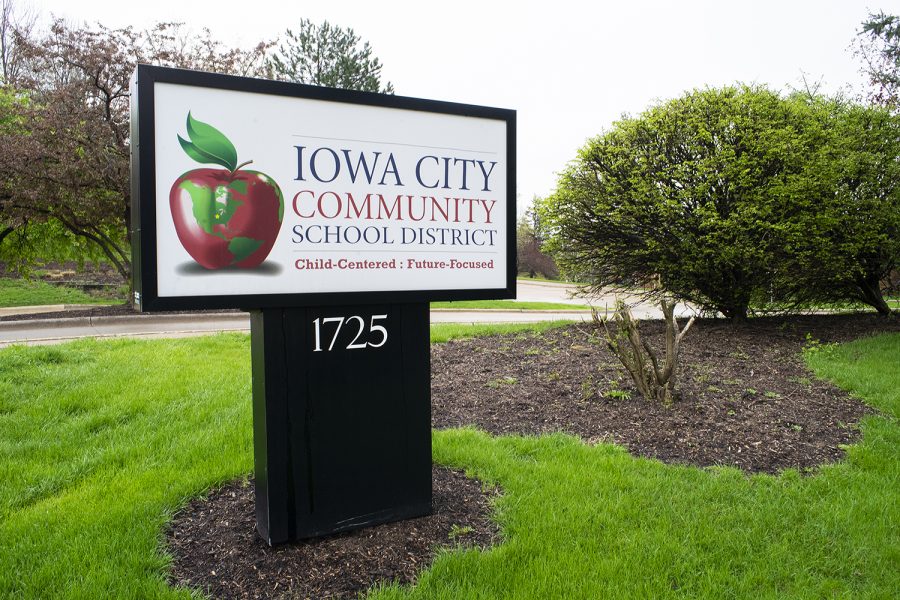Iowa Youth Writing Project aims to inspire K-12 students digitally as schools are closed
Amid COVID-19 self isolation and social-distancing measures, the Iowa Youth Writing Project has halted a majority of its routine programs and services. As the organization transitions to a virtual format, its focus is on inspiring a sense of creativity among K-12 students in Iowa.
The Iowa City Community School District sign is seen on April 29, 2019.
April 8, 2020
The Iowa Youth Writing Project is tackling a number of new tactics in an effort to maintain continuity and breed creativity among K-12 students in Iowa as schools close to mitigate the spread of the novel coronavirus.
The University of Iowa affiliate program’s in-person services used to include weekly, free creative-writing workshops at K-12 schools, community centers, after-school programs and rehab facilities, as well as special events such as the upcoming Junior High Writing Conference, said Mallory Hellman, director of the Iowa Youth Writing Project.
With the inability to conduct these services in-person, the project is shifting to the digital realm, Hellman said, which makes it more difficult to develop connections through conversations with the kids who participate.
“It becomes a completely different prospect when you move that programming online,” Hellman said.
The biggest question the project must currently answer is how to support its community effectively without spreading the organization itself too thin, Hellman added.
A large part of the new digital initiative, Hellman said, is coming from the UI’s writing and community outreach class — a core College of Liberal Arts and Sciences general-education course offered to undergraduate students.
Students enrolled in the Diversity and Inclusion class this semester are normally responsible for volunteering at the Iowa Youth Writing Projects sites, Hellman said. Now, these students are responsible for creating blog posts and videos for their audience to engage with writing and educate parents on teaching literacy techniques.
Over the summer, the project will post a weekly writing prompt for teens and elementary students, Hellman said. Exceptional responses could be published on its website.
“If nothing else, we always communicate to our students that writing is a way of reaching an arm into the universe and saying ‘hello, here’s who I am, here’s how I’m feeling, has anybody else ever felt this too?’” Hellman said. “Especially at a time where we can’t see one another’s faces, when we can’t go to school and see our classmates and our friends and maybe even nobody except our family or our siblings, what better a time to engage with the art of reaching out through words?”
One of the Iowa Youth Writing Project’s special events affected by the COVID-19 mitigation efforts is the annual junior-high writing conference, Hellman said.
This conference typically brings more than 300 students from nine schools across Iowa together to “empower, inspire, and engage them with creative arts and creative thinking,” said Emily Spencer, associate director of the Iowa Youth Writing Project.
Related: University of Iowa seniors may participate in fall 2020 or spring 2021 commencement ceremonies
Spencer said many factors have affected the 2020 conference’s shift to an online format. The conference will either be offered asynchronously on a UI online learning platform or synchronously and asynchronously on both live conference software with security settings in place and an asynchronous UI online learning platform, Spencer said.
“Our choice to incorporate asynchronous programming is for greater equity and our choice to select our live settings is for greater online security,” Spencer said in an email to the DI.
Spencer said conference formats will vary, depending on whether kids have returned to school at that point in time or are still at home. The Iowa Writing Youth Project is also considering factors such as equity, internet access, and student access to laptops, in the planning process, she added.
The goals of the conference will remain the same, Spencer said, and students will get the same writing experience they would have with the in-person conference.
“It’s important because of the need to continue arts outreach during this time so that students have a continuity of engagement and learning,” Spencer said.
UI theatre graduate student Steven Willis, a spoken-word poet, three-time individual world poetry slam finalist, and former full-time teaching artist and poet, will be the keynote speaker and poetry workshop instructor for this year’s conference.
Willis said the message he hopes to convey to students will not change, even if the conference seems different on a digital platform.
“I come from acting and I come from spoken-word poetry, so I do believe that there is a very particular aesthetic and a particular magic that comes with being in the room with people performing live, so I’m definitely going to miss that aspect of it,” Willis said. “But I do think that with the overall approach, the idea of what I want to get across to the students will still remain.”
Willis said he thinks it’s important that the conference still happens because it will help maintain a sense of normalcy for students, while also placing an emphasis on education and imagination-building.
“… I felt like, ‘Yeah, that’s right, the show must go on,’ because academia is still going on and the inspiration shouldn’t stop either — that’s an equally important teaching tool,” Willis said.



